Proposal sounds like development bait and switch
Before members of the city of Miami’s Historical Preservation Committee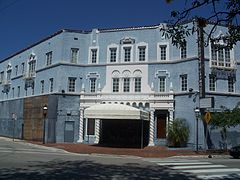 meet Tuesday afternoon to consider an application to “restore” the Coconut Grove Playhouse, they ought to look up the word restore in the dictionary.
meet Tuesday afternoon to consider an application to “restore” the Coconut Grove Playhouse, they ought to look up the word restore in the dictionary.
Then they ought to categorically deny this proposal because it is more about redeveloping our historic gem of a theater and turning it into another Cocowalk than preserving its legacy.
That’s not the only thing opponents of this plan — who plan to flood City Hall — are concerned about.
They worry that there is enough retail and restaurants in the Grove that don’t need the competition. They worry that all the loading access points for service vehicles and garbage trucks front the residential abutting Charles and Williams streets. They worry that the two lane Main Highway in front of the theater and garage may be expanded (where they’ll get the space, Ladra doesn’t know).
What’s certain here is that there is enough concern and residential hand-wringing about this to take a second look.
Miami-Dade County, which is funding the “renovation” project, wants to 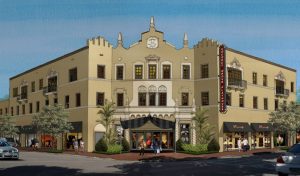 demolish the 1,100-seat theater and replace it with mixed-use development: A 300-seat theater, a 200-seat restaurant, some retail, possibly apartments and a 400-plus space parking garage. The only thing that will be restored is the entrance facade and box office. How is that a restoration? What historic restaurant was there?
demolish the 1,100-seat theater and replace it with mixed-use development: A 300-seat theater, a 200-seat restaurant, some retail, possibly apartments and a 400-plus space parking garage. The only thing that will be restored is the entrance facade and box office. How is that a restoration? What historic restaurant was there?
It’s a slap in the face to true preservationists and theater lovers — as well as voters.
“Its absurd for them to demolish the Playhouse,” said Carmen Pelaez, a playwright whose play RUM & COKE had an extended sold out run in the BlackBox at Coconut Grove Playhouse in 2003.
“Its history didn’t happen in the facade, it happened on both its stages. It’s one of of the the only historic theaters in Miami of national importance and it’s earned its right to be restored to its original MainStage and BlackBox configuration,” Pelaez said.
“Our goal should be to restore it’s reputation as a first class regional theater where pre-Broadway runs can develop next door to smaller curated productions giving local theater makers the chance to interact with their international peers and Miami theater goers can benefit from a thriving theatrical community in the heart of Miami.”
That sounds about right. In fact, it sounds a lot like what voters had in mind when they approved the $15 million the county wants to use (in total $20 M) on this project. The funds come from the 2004 Building Better Com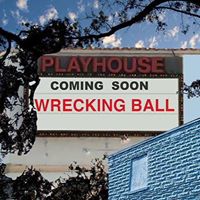 munities Bond, where voters approved $15M of the pie for “reconstruction of Coconut Grove Playhouse to restore its structureal integrity and add to its performance and educational capabilities.” The other $5 mil come from the 2005 Convention Development Tax Bond for “the reconstruction and expansion to the Coconut Grove Playhouse to remedy structural deficiencies and improve the programmatic capabilities of the theater.”
munities Bond, where voters approved $15M of the pie for “reconstruction of Coconut Grove Playhouse to restore its structureal integrity and add to its performance and educational capabilities.” The other $5 mil come from the 2005 Convention Development Tax Bond for “the reconstruction and expansion to the Coconut Grove Playhouse to remedy structural deficiencies and improve the programmatic capabilities of the theater.”
Notice that nowhere does it say restaurant. Or apartments. Or Coach store. Notice the bonds were to expand the theater, not shrink it to less than a third of its size.
In 2004, two years before the doors closed because they couldn’t sell enough tickets, the Coconut Grove Playhouse had an economic impact estimated at more than $20 million per year and a report said it was responsible for up to 40% of the commercial activity in the area. Forty percent! That information, plus the promise to match the public funds through private fundraising, is what drove voters to approve a $15 million bond grant, again, to “restore [the] structural integrity and add to performance and educational capabilities.”
Now, 13 years later, the county is instead pursuing a plan that would invest that $15 million, plus another $5 mil, in 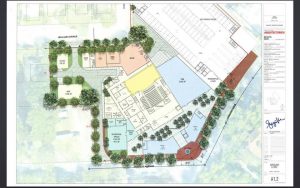 the building of a brand new 300-seat theater behind the historic theater’s entrance facade and turning it over, free-of-charge, to an organization with an average annual operating budget of $1.3 million, including public money that is not guaranteed forever. Ladra was informed that the county ignored its own criteria of requiring the “major cultural instutition” it provides the lease to have a $1.5 annual million budget. But the only year that Gables Stage had that, activists say, is in 2013, when it got an $800,000 grant from Miami-Dade itself.
the building of a brand new 300-seat theater behind the historic theater’s entrance facade and turning it over, free-of-charge, to an organization with an average annual operating budget of $1.3 million, including public money that is not guaranteed forever. Ladra was informed that the county ignored its own criteria of requiring the “major cultural instutition” it provides the lease to have a $1.5 annual million budget. But the only year that Gables Stage had that, activists say, is in 2013, when it got an $800,000 grant from Miami-Dade itself.
Then Ladra also hears that there wasn’t really an open, competitive process for the 99-year lease with Gables Stage and the Florida International University. These two are fine institutions and wonderful providers of theater, and as the mother of a 16-year-old thespian and musical theater enthusiast with very few options out there, I’m excited about the educational opportunities (hoping they are affordable). But was the process fair? And couldn’t a more collaborative effort by many other theater companies be better? Some in the theater industry feel like it was a cooked deal that “wreaks of favoritism.”
And then there is the undeniable feeling — supported by recent multi-million property sales — that this is being railroaded through as part of a bigger picture redevelopment of the old Grove main street business district. In other words, this may be driven by money, not art. Activists and Playhouse lovers feel blindsided. They say that Miami Dade Cultural Affairs Director Michael Springer had promised not to demolish the theater in 2013. But now, they say, they feel like this has always been the plan.
In 2013, another architect — a man who has restored Miami Freedom Tower, Miami City Hall, Miami Woman’s Club, Gusman Center for the Performing Arts and Vizcaya Village — had presented a plan to open a 700-seat theater and restore some of the interior of the Playhouse. Richard J. Heisenbottle wrote a letter recently published in the Coconut Grove Grapevine that also ought to be considered before the current plan moves forward:
“From the outset of discussion on the re-birth of the abandoned Coconut Grove Playhouse it has been assumed by the Miami-Dade County that only the front façade of the building is contributing to its historic designation. This assumption was made because the authors of the approved City of Miami Historic Designation Report, placed one sentence to that effect in the designation report. This one sentence probably went unnoticed by many HP Board members as they voted for its designation, but years later that one flawed sentence has shaped the assumptions on which Miami-Dade County’s cultural facilities building program was based. That assumption is that except for the main façade Miami-Dade County can tear down the remainder of the Richard Kiehnel designed theater and build a new 300 seat theater in its place.
“It is questionable whether those who authored this report ever toured the theater’s interior. For if they had, they would not have missed the remarkable original proscenium arch, low relief plaster ceiling, cornice moldings and twisted columns all of which are still intact and contribute to its historic character and its historic designation.
“This flawed assumption has resulted in the county commission voting to go forward with cultural facilities building program for a new 300-seat theater that is seriously flawed from cultural, economic and historic preservation perspectives. There are literally thousands of successful restored historic theaters throughout the country from Broadway to Main Street and the Coconut Grove Playhouse deserves to be one of them.”
There are a lot of people who feel a 700-seat theater would do more for the Grove than another restaurant. It would bring more people into the area that would then eat before or after a show. It would bring 700 people extra in, not 300 people and then a few hundred who were coming into the area anyway but now choose a new eatery to spend money in.
“At Washington University School of Business one of the first things we learned was that a business must define itself, what it is and what it does,” said activist Barry White. “The Coconut Grove Playhouse was and always should be a theater, a cultural and educational icon, and an economic driver for the area. In those roles it does not need to compete with restaurants and retail in the area for whom it is only supposed to attract visitors.
Some people would like to see two theaters remain.
“A 300-seat theater with 200 performances a year will attact 60,000 people annually and, at an average $35 per seat, produce $2.1 million in revenue. Adding a 750 seat theater with 200 performances a year would add 150,000 visitors per year and, at $35 per seat, add $5.2 mil a year. That is a total of $7.35 million in theater revenue and an additional 210,000 visitors to the Grove annually,” White said in an email to me where he directs himself to the historic preservation board.
“The Playhouse is a theater and an audience attractor. Don’t let misguided people who wrongly think it should be a self contained money machine disuade you. It will be a money machine by selling tickets to fine theatrical presentations to over 200,000 people annually — its only function, its only role.”
Activists also feel that Mike Eidson and The Coconut Grove Playhouse Foundation have caved in to the county’s pressure to demolish the historic theater, which, again, violates the voters’ mandate to use our tax monies to restore, not demolish, this landmark.
Miami-Dade Commissioner Xavier Suarez, who seems to be in favor of the current  plan but did not return a text late Monday from Ladra, has always been one to listen to his constituency and change course if he needs to. I hope he will put the brakes on this project until we can learn more about the possibility of a full restoration.
plan but did not return a text late Monday from Ladra, has always been one to listen to his constituency and change course if he needs to. I hope he will put the brakes on this project until we can learn more about the possibility of a full restoration.
There is concern that the decision Tuesday is already made, that money is talking here and that the hearing is just a show before the rubber stamp. Hopefully, there will be enough opponents to cause some pause of the demolition of this historic place. Because once the wrecking ball has gone through it, it will be too late.
Like Lt. Gov. Carlos Lopez-Cantera told everyone at the December 8 town hall meeting about the playhouse future: “This theater belongs to the people and the people decide what happens to it.”
And by “people,” Ladra is pretty sure he meant us, not those who stand to profit from building apartments.
read more
April showers bring May flowers, but what do elections, transportation meetings and town halls bring?
The Cortadito Calendar starts April off with a long day on  transit and transportation talk as the new Miami-Dade Transportation Planning Organization, the old Metropolian Planning Organization with a new name, meets for two meetings Monday like its in a hurry or something. Then we have another massive Tuesday before us.
transit and transportation talk as the new Miami-Dade Transportation Planning Organization, the old Metropolian Planning Organization with a new name, meets for two meetings Monday like its in a hurry or something. Then we have another massive Tuesday before us.
What is it about Tuesdays?
As always, please keep sending information about your government meetings, candidate forums and political powwows to edevalle@gmail.com and they’ll keep appearing in the Cortadito Calendar. Try having something on a Wednesday or a Friday.
MONDAY — April 3
10:15 a.m. — The Miami-Dade Transportation Planning Organization (the old MPO) will start an marathon of meetings at 10:15 a.m. Monday — not 10 a.m., not 10:30 a.m. — to discuss fiscal priorities. There will be presentations about financing options as the Miami-Dade Expressway Authority lays out the toll road structure and the Citizens Independent Transportation Trust talks about tax increment financing. There will also be a discussion about integrating any south rail corridor project to a Homestead park and ride.
1:45 p.m. — The same Miami-Dade Transportation Planning Organization continues i ts work — like there’s a fire somewhere — with its mobility meeting, in which they will discuss the possibility of establishing a transit authority. Is that another taxing agency? There will also be more presentations as the MDX gives one on its strategic plan and a guy named Jim Wolfe talks about the Coppenhagen tour and pilot project. They will also hear about the Miami-Dade Quick Build Program. Does it seem to anyone else like a lot is happening on this front?
ts work — like there’s a fire somewhere — with its mobility meeting, in which they will discuss the possibility of establishing a transit authority. Is that another taxing agency? There will also be more presentations as the MDX gives one on its strategic plan and a guy named Jim Wolfe talks about the Coppenhagen tour and pilot project. They will also hear about the Miami-Dade Quick Build Program. Does it seem to anyone else like a lot is happening on this front?
TUESDAY — April 4
8:30 a.m. –The Tuesday Morning Breakfast Club returned last week with commission candidate Joshua 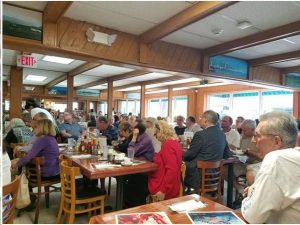 Levy and Puerto Sagua Restaurant was packed (see the photo t the left, courtesy Daniel Ciraldo). This week, the guest speaker is Zachary Eisner, who is also running in Group 2. Next week, we’ll hear from yet another Group 2 candidate, Rafael Velasquez. This looks like it is the real Tuesday Morning Breakfast Club. But longtime moderator, David Kelsey, who is president of the South Beach Hotel and Restaurant Association, hosts another TMBC meeting at another location. He originally was going to launch April 11th but now it’s been postponed to April 25. Meanwhile, this breakfast club will meet this Tuesday morning Puerto Sagua Restaurant, 700 Collins Ave.
Levy and Puerto Sagua Restaurant was packed (see the photo t the left, courtesy Daniel Ciraldo). This week, the guest speaker is Zachary Eisner, who is also running in Group 2. Next week, we’ll hear from yet another Group 2 candidate, Rafael Velasquez. This looks like it is the real Tuesday Morning Breakfast Club. But longtime moderator, David Kelsey, who is president of the South Beach Hotel and Restaurant Association, hosts another TMBC meeting at another location. He originally was going to launch April 11th but now it’s been postponed to April 25. Meanwhile, this breakfast club will meet this Tuesday morning Puerto Sagua Restaurant, 700 Collins Ave.
9:30 a.m. — The Miami-Dade County Commission is giving mo’ money away at their meeting that begins at 9:30 a.m. Tuesday. That includes $19.4 million in information technology equipment and software, $5.5 million to Jacobs Engineering engineering design services for stormwater sewer stuff, another $5.5 million to Ricondo & Associates for aviation planning and consulting services, $5.5 million for training in the human resources department (two separate contracts for $2.5 and $3 million), and $1.6 million for three buses. They’re also going to talk about using some of the County Hall property for a clinic for employees and a day care for employees. And they will probably give final approval to Resorts World Inc, the Genting casino people, to develop a hotel and retail over the Omni bus terminal. The meeting might end by 3 p.m., which is lucky for Commissioner Xavier Suarez because Ladra is certain he will want to go to…
3 p.m. — The city of Miami’s Historic Preservation Board will hear plans from Miami-Dade County and Florida International University to rebuild and re-open the Coconut Grove Playhouse and it looks like there will be  plenty of public comment — both for and against. Sure, there are activists and others who support the restoration of the historic building and bring theater back to the Grove. But others think the restoration is really in name only, since the only real part that gets saved is the facade. The proposal aims to demolish the interior of the building and replace the 1,100 seats with a 300-seat theater, a 200-seat restaurant, some retail space and a 400+ space parking garage. Nearby residents are also opposed to having all the loading and garbage access abutting their properties on Charles and Williams avenues, as well as the possible expansion of Main Highway from two to four lanes. They hope that Archtectonica and Jorge Hernandez, the firm and architect proposing this, don’t speak for two hours and “suck all the air out of the room.” This should be a lively discussion.
plenty of public comment — both for and against. Sure, there are activists and others who support the restoration of the historic building and bring theater back to the Grove. But others think the restoration is really in name only, since the only real part that gets saved is the facade. The proposal aims to demolish the interior of the building and replace the 1,100 seats with a 300-seat theater, a 200-seat restaurant, some retail space and a 400+ space parking garage. Nearby residents are also opposed to having all the loading and garbage access abutting their properties on Charles and Williams avenues, as well as the possible expansion of Main Highway from two to four lanes. They hope that Archtectonica and Jorge Hernandez, the firm and architect proposing this, don’t speak for two hours and “suck all the air out of the room.” This should be a lively discussion.
7 p.m. — A community workshop on the expansion plans proposed by Bal Harbour Shops will begin at 7 p.m. Tuesday at the Sea View Hotel, 9909 Collins Ave. The controversial 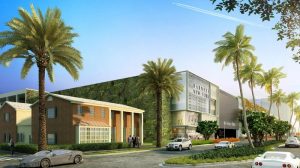 plans have been scaled back from the original proposal to add 300,000 square feet of retail and they no longer want to buy the historic City Hall building adjacent to their property. But some believe it’s still too big and there’s concern about their offer to build a second city hall on Collins Avenue. Why would the village need another city hall, unless they still want to take over the old one? Someone ought to ask that Tuesday night.
plans have been scaled back from the original proposal to add 300,000 square feet of retail and they no longer want to buy the historic City Hall building adjacent to their property. But some believe it’s still too big and there’s concern about their offer to build a second city hall on Collins Avenue. Why would the village need another city hall, unless they still want to take over the old one? Someone ought to ask that Tuesday night.
WEDNESDAY — April 5
All day — It’s Miami-Dade County Day in Tallahassee and that means that some of our commissioners are going to be in the state capital, urging legislators to pass laws that benefit us and seeking public funding for projects here. They’re going to have paella around noon and then meet with Gov. Rick Scott and the cabinet, Miami-Dade Delegation Chairman Jose Felix Diaz and other 305 legislators before the Mambo Kings reception at Maddox Square at 7 p.m. and the after party at the Hotel Dade Days regulars include Mayor Carlos Gimenez and commissioners Rebeca Sosa, Jose “Pepe” Diaz and Esteban Bovo.
THURSDAY — April 6
11 a.m. — The Miami-Dade Chairman’s Policy Council is expected to meet Thursday to discuss the process for awarding $14 million in grants to non-profits and community organizations. This buck was passed to them at the last commission meeting, where commissioners were unable to give the grants as recommended by the county’s long and thoughful process mostly because some favored political groups were cut out. But Ladra is not certain it’s going to happen, since it’s still Dade Days in Tallahassee and there is an awards luncheon for people in our community that commissioners may want to stay for. There was no preliminary or official agenda online over the weekend.
FRIDAY — April 7
10 a.m. — Miami-Dade Commissioner Daniella Levine Cava will cut the ribbon on the new Accelerate South Dade: Small Business and Nonprofit Incubator at an event from 10 a.m. to noon Friday in Cutler Bay. She will be joined by Cutler Bay Mayor Peggy Bell and Town Manager Rafael Casals at the event at 10700 Caribbean Blvd., Suite 301. Also going: Leroy Jones, Executive Director, Neighbors and Neighbors Association, Inc. (NANA) and representatives of the Economic Development Council of South Miami-Dade, The Beacon Council, the Small Business Development Center at FIU and CareerSource South Florida.
read more












